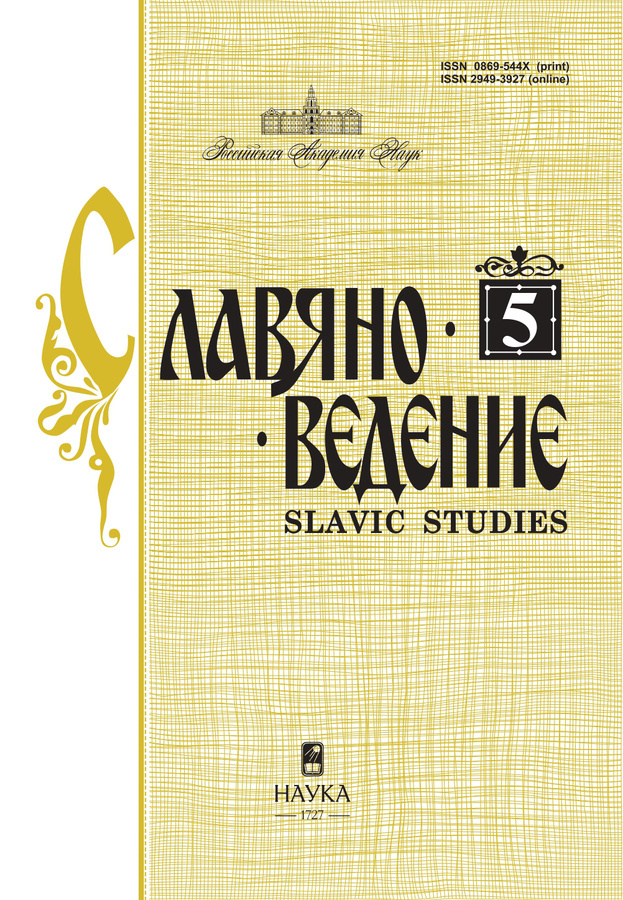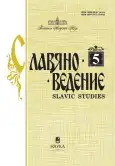No 5 (2025)
Articles
"The Old Tsarist General" Grigory Yanushevsky at the Crossroads Between Ukraine and Russia
Abstract
The article is devoted to the biography of Lieutenant General Grigory Yanushevsky, who served in the Hetman, Petliura and White armies, and then became interested in pseudo-historical research and tried to prove the reality of three brothers from the etymological legend - Czech, Lech and Rus. The author examines the connection between the general's military career, his "scientific" research, and his national self-identification. Not wanting to serve the Bolsheviks, Yanushevsky joined the Ukrainian army, then he was captured by the Whites and was in the reserve of the Russian army in Wrangel's Crimea. The Whites treated the general with disdain, prompting him to realize his Ukrainian identity and rejoin the Petliura army, but he did not find a place for himself there either. Having begun to promote the idea of the origin of Rus' from Croatia, the general found admirers among Russian emigrants and returned to Russian identity himself.
Slavianovedenie. 2025;(5):5-17
 5-17
5-17


Resettlement Question in National Periodicals of Western Outskirts of the Russian Empire (1905-1914)
Abstract
The article studies the reflection of the problem of mass migration from the western provinces of the Russian Empire in Belarusian, Moldavian and Ukrainian journalistic discourse of the early 20th century. The research is based on the set of publications in national newspapers and magazines published between 1905 and the beginning of the First World War. Most authors negatively assessed the phenomenon of mass migration of their "compatriots" to Asian Russia and the New World. Trying to reduce the spread of resettlement movement, they adopted both economic arguments (the difficulties of running a household in a new place, the misfortune of most settlers, alternatives to agricultural practices, etc.) and "patriotic" ones, including an appeal to the concepts of "homeland", "home", "land given by God and ancestors" etc. Belarusian and Moldavian authors agreed that the main reason for the peasants' outcome was the lack of education in their native language. Ukrainian journalists discussed the consequences of resettlement and the fate of the migrants in terms of national identity. Some considered them "lost to the nation", while others saw the prospect of creating a "New Ukraine" in the areas of compact settlement in the Russian Far East.
Slavianovedenie. 2025;(5):18-33
 18-33
18-33


Conflicts in Albania and Around It in the Perception of Russian Periodicals from August 1913 to July 1914
Abstract
The article examines the perception by Russian press of military operations in the Balkans in the interval between the end of the Second Balkan War and the beginning of the First World War. In the paper there are examined, for the first time, the reaction of Russian newspapers and travelers to the Albanian crisis of 1913-1914 and military operations in the region, to the internecine war and uprisings within Albania. On the example of weekly newspapers "Slavyanskie Izvestia", "Ogonek" and "Dym Otechestva", the monthly magazines "Vestnik Evropy", "Russkoe Bogatstvo" and "Russkaya Mysl'", the change in assessments and forecasts for the future of Albanian statehood. Attention is paid to the perception in Russia of the Greek-Albanian (Epirotic) and Greek-Turkish (Aegean) border conflicts as well as the Macedonian one during this time. The growing awareness of Russian public about Albania and Albanians and the preparedness of the Balkan peoples for the escalation of the conflict with Austria-Hungary, Germany and Turkey are demonstrated.
Slavianovedenie. 2025;(5):34-52
 34-52
34-52


Christian Confessions of the SFRY in the Archival Materials of the Council for Religious Affairs Under the Council of Ministers of the USSR in 1980-1991
Abstract
Based on the materials available for study from the Council for Religious Affairs under the Council of Ministers of the USSR from its fond in the State Archive of the Russian Federation, an attempt was made to analyze the degree and mode of involvement of the Council for Religious Affairs in the interaction of religious organizations of the USSR and the SFRY in 1980-1991. The role and main forms of participation of this body in maintaining of the Soviet-Yugoslav inter-church contacts over the specified period are revealed, and the priorities in its activities in the Yugoslav segment of the foreign and confessional policy of the USSR are assessed.
Slavianovedenie. 2025;(5):53-66
 53-66
53-66


Draft of a New Ideographic Dictionary of Slavic Languages
Abstract
More than 70 years ago, the well-known dictionary of selected Indo-European synonyms by C.D. Buck was published. It represents an important work in the field of comparative lexicology and semantic reconstruction. It is structured according to the ideographic principle and covers 22 thematic groups, reflecting various aspects of human life, nature, and abstract concepts. The dictionary is far from being exaustive, as not all Slavic data were included; only Serbo-Croatian, Czech, Polish, Russian, and Old Church Slavonic were represented. The authors make a cause for why it is necessary to create a new ideographic dictionary of Slavic vocabulary, constructed in accordance with the principles of Buck's work, but including data from all Slavic literary languages (Russian, Ukrainian, Belarusian, Polish, Kashubian, Upper Sorbian, Lower Sorbian, Czech, Slovak, Bulgarian, Macedonian, Serbian, Croatian, Slovenian, Old Church Slavonic), as well as a number of neighbouring languages (Lithuanian, Romanian, Albanian, Greek, Hungarian). Unlike Buck's dictionary, a more detailed semantic and etymological analysis of Slavic vocabulary is envisioned. A number of errors made by Buck in the collection of Slavic material are demonstrated. The tasks and theoretical foundations of the new dictionary are defined, and examples of dictionary entries for "World", "Man", and "Father-in-law (father of the wife); Father-in-law (father of the husband)" are provided.
Slavianovedenie. 2025;(5):67-79
 67-79
67-79


Essays
Prince N.A. Orlov and the Polish Question in the Early 1860s: Subjective Schemes and/or State Diplomacy
Abstract
The article discusses the attempts made in the early 1860s to resolve the Polish question by Prince N.A. Orlov (1827-1885). As an envoy to the Belgian court, he was in close contact with the Polish elite in exile. He advocated the reconstruction of Poland based on the model of Serbia and Egypt, trying to persuade Emperor Alexander II, Grand Dukes Konstantin and Nikolai in personal conversations. In his arguments, he emphasized the diplomatic and international importance of the issue. In expressing his personal opinion, Prince N.A. Orlov, of course, voiced the position of a certain part of the Russian aristocracy, which combined loyalist and liberal sentiments. For the first time in scientific discourse is published the letter from Orlov to Alexander II, describing the plans of Polish aristocrats for the future of the region after the February 1864 uprising. The source expands the existing historiographic ideas about the attitude towards the Polish Uprising in Russian diplomatic circles, outlines an alternative view of the reorganization of Poland and reflects the mechanisms of information and influence on decision-making at court.
Slavianovedenie. 2025;(5):80-91
 80-91
80-91


The film "In the Mountains of Yugoslavia" in the Context of Relations Between the USSR and the FPRY
Abstract
The article deals with Abram (Abraham) Room's film "In the Mountains of Yugoslavia" (1946), that may be considered the beginning of the cinema of the FPRY-SFRY. The film had a difficult distribution fate, was subjected to numerous censorship edits, and during the conflict between the Soviet Union and Yugoslavia was, in fact, "shelved" (or "bunkered"). Nevertheless, no other Soviet-Yugoslav joint project in cultural or art field had such a deep and lasting political resonance. An analysis of archival documents and memoirs allows us to conclude that the film, classified by many as "hack work" or "lame", was in fact ahead of its time and was created with the foresight of the inevitability of a crisis in relations between the USSR and the FPRY. Moreover, the film played an important role in the confrontation of the Soviet and Yugoslav leaders at its initial stage. The article also highlights some historical aspects of the cultural policy of the Yugoslav ruling party, the activities of the Yugoslav Agitprop, and provides an outline of the collective moviemaking of the Soviet Union and Yugoslav communists, beginning in 1944.
Slavianovedenie. 2025;(5):92-106
 92-106
92-106


TO THE JUBILEE OF THE JOURNAL
Leading Russian Journal of Slavic Studies
Slavianovedenie. 2025;(5):107-110
 107-110
107-110


Journal Slavic Studies in the 1990s: Answers to the Challenges of the Time (Medieval History and Ethnolinguistics)
Slavianovedenie. 2025;(5):111-114
 111-114
111-114


About the Journal Slavic Studies
Slavianovedenie. 2025;(5):115-119
 115-119
115-119


From the history of Slavic studies
The Slovak Thaw of the First Half of the 1960s Viewed by a Young Soviet Literary Scholar. Trip of Yu.V. Bogdanov to Czechoslovakia (1963-1964)
Abstract
The post-Stalin thaw, which swept through all the countries of the Soviet bloc, due to specific historical circumstances, was late in Czechoslovakia in comparison with neighboring Poland and Hungary. The renewal processes here gained momentum only in 1963. In Slovakia, these processes had their own specifics and were associated with demands for expanded autonomy and bringing to the fore the tasks of national revival. Readers are offered a report on the trip of a young literary scholar, later a leading Russian specialist in Slovak literature, Yu.V. Bogdanov, who spent 4 months in Czechoslovakia (including 3 months in Slovakia) at the end of 1963 - beginning of 1964. Note from Yu.V. Bogdanov is interesting not only for the assessments it contains of the literary process, the creativity of individual writers and the state of literary scholarship. It also reflected the socio-political changes taking place in the country.
Slavianovedenie. 2025;(5):120-135
 120-135
120-135


Reviews
O.V. Kochukova, S.A. Kochukov. An Artist on the Battlefield: Reportage Graphics of the Russo-Turkish War, 1877-1878; O.V. Kochukova, S.A. Kochukov. Heroic Liberators. Album of Engravings on the History of the Russo-Turkish War of 1877-1878
Slavianovedenie. 2025;(5):136-139
 136-139
136-139


Soviet and West Belarus: Disengaged but Unified, 1921-1939. Documents and Materials
Slavianovedenie. 2025;(5):140-142
 140-142
140-142


A.I. Miller. The Ukrainian Question and Identity Politics: Collection of Scientific Papers, ed. by D.V. Efremenko
Slavianovedenie. 2025;(5):143-145
 143-145
143-145


Scolarly life
Scientific Conference "Pragmatic Potential of Verb Categories in the Russian Language"
Slavianovedenie. 2025;(5):146-149
 146-149
146-149


In memoriam
Professor Dragoljub Petrović (1935-2024)
Slavianovedenie. 2025;(5):150-152
 150-152
150-152













